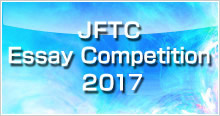Remarks by Selection Committee Chair, Dr. Iwao NAKATANI
For the JFTC Essay Competition 2008, we received a total of 151 essays from 35 nationalities including Japan, the highest numbers of entries and nationalities of entrants so far. Sixty percent of the essays were submitted by foreign nationals, reflecting the increasing international character of the competition. As chair of the Selection Committee, I am delighted that we received so many interesting essays from countries all over the world. There has never been an essay competition in Japan that has gained such international participation. I would like to express my sincere appreciation to the Japan Foreign Trade Council, Inc. (JFTC) for continuing to hold this essay competition and to the members of the Committee who have again taken time out of their busy schedules to assist in the screening of essays.
The theme of this year’s competition was “The Possibility of ‘Japanese-Style Business Models’ for Preserving the Earth.” The solution of environmental problems, such as pollution and depletion of natural resources, is now an urgent matter and the role of Japan is becoming increasingly important. We were strongly impressed that so many of the essays submitted expressed high expectations for Japanese corporations in the solution of global environmental problems, making us profoundly aware of Japanese corporations’ great responsibility in this regard.
All the essays provide an interesting perspective on this year’s theme and are well worth reading. Unfortunately, however, the Selection Committee did not feel that there was one outstanding essay that it could strongly recommend for the Grand Prize this year. Consequently, we decided to select the following four essays for the Prize for Excellence.
Kamila PIECZARA:
“Reinforcing the Japanese Brand as Environmental Leader: The Role for Corporations”
The author provides a well-balanced analysis of how Japanese corporations have succeeded in improving their ability to respond to environmental issues. The author makes the very interesting point that the "soft" assets of Japanese culture have played a major role.
WONG, Chun Yiu:
“Anatomy of Japanese Business Leading to Sustainable Growth”
The author explains environmental management by Japanese corporations, drawing on a wide range of examples. His persuasive argument that responding to environmental problems is not a cost burden but a business opportunity is particularly commendable.
Ananya MUKHOPADHYAY:
“Japanese Environmental and Energy Services – The Dark Horse”
The author argues convincingly that the difficulty many developing countries may face in taking environmental measures lies not in capital investment but in providing the services required, expressing high hopes for the contribution of Japanese corporations in this field.
Naoki ABE:
“From 'Differential-Oriented Management' to 'Integral-Oriented Management' – Three Paradigm Shifts”
The author argues persuasively how, amid the current concerns about the limitations of natural resources, Japanese corporations can change their conventional ways of thinking and avoid the fate of a country with limited natural resources in the long term.
Not a few of the essays submitted this year were by writers in their teens. Since the majority of the members of the Committee expressed the opinion that an outstanding essay among these should be commended for their encouragement, we have decided to award a Selection Committee Chair’s Special Prize to “Japan’s Green Technology for Earth and Economy” by Shellen HALIM, who argues convincingly that environmental problems represent great business opportunities for Japanese corporations and that it is particularly important for them to place emphasis on their relationships with developing countries, especially in Asia.

